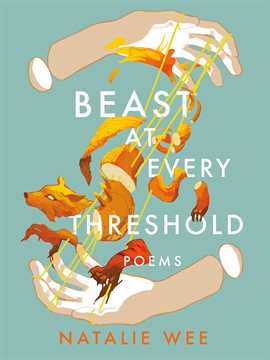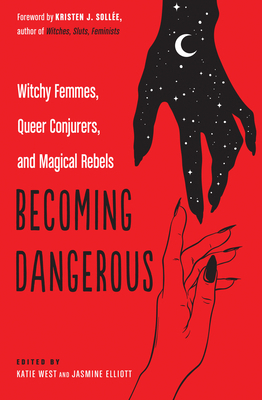Welcome to the second installment of my Read Harder challenge! In case you missed the beginning of this series, check out my previous blog post where I explain what the Read Harder challenge is, and what this series is all about!
 Task 7: Read an indie published collection of poetry by a BIPOC or queer author
Task 7: Read an indie published collection of poetry by a BIPOC or queer author
Book Read: “Beast at Every Threshold” by Natalie Wee
April is National Poetry Month, so naturally I had to put the poetry collection in this update. On top of which, the poet I read from, Natalie Wee is both queer and BIPOC (born in Singapore to Malaysian parents), so double points, maybe even triple points? Just kidding, welcome to the Read Harder Challenge, where the rules are made up, and the points don’t matter!
Reviewing poetry is difficult for me — as my poet stepmother can tell you (hi Meg, I know you’re reading this), poetry is an important art form separate from prose writing, but my range goes from Shel Silverstein to high-school level Emily Dickinson; it often goes over my head. I even tend to skip over narratives told in verse, which seems to be a style growing in popularity. Part of the difficulty I have when looking for poetry is that the kind of works I’m most interested in are the ones with the highest potential to be a swing and a miss. Let me explain: Autobiographical poetry, people who speak from their life experiences, especially about race, gender and sexuality, can be so arresting when it connects. At the same time, what can be so personal and cathartic to the poet can come across to the reader as missing important context. The poem is clearly important, but without knowing the shape of how or why it was written, it lacks a certain amount of oomph. Which is not to say we as readers are owed anything, certainly not when the poet has already laid themself bare for us.
As I was reading through this collection, I found some poems and some lines that made me pause and reflect, made me want to write them down for later study. Many more however felt as if I was listening to a one-sided conversation (isn’t all writing a one-sided conversation, from writer to reader?) Poems were formatted more than a dozen ways throughout the collection, some stronger than others, and it occasionally felt as if the poet was consulting a thesaurus when writing. Obviously take this review with a grain of salt, and please judge for yourself.
Task 5: Read a sci-fi novella
Book Read: “The Word for World is Forest” by Ursula K. Le Guin
If there’s one thing Ursula K. Le Guin is going to do, she’s going to make sure you know her thoughts on war and colonization. I’ve written about this before, but what Le Guin does so masterfully is quickly lay out the world and whatever situation the inhabitants are facing, and brings the readers on side, leaving little question as to the underdogs we’re rooting for. This isn’t to say there are distinct heroes and villains in her stories, characters have their own reasons for doing what they do, even if what they do seems obviously abhorrent to the reader. That being said, “Forest” which first published in 1972 as part of an anthology, featured one of the most difficult perspectives I have ever read from.
The novella cycles through three point of view characters: Selver, an Athshean and reluctant hero to his people, Raj Lyubov, a human anthropologist working with the military and friend to Selver, and Don Davidson, a human military commander and frankly disgusting human being. The story opens from Davidson’s perspective, and I had to double check I was reading a Le Guin title if only because being in Davidson’s brain made me want to bleach my eyes. To be clear, the character was incredibly well written, because the reader is meant to immediately hate him.
This novella is part of Le Guin’s larger Hainish Cycle, although they can be read in any order. Given that this is a novella, it is difficult to discuss in too much detail without veering into spoilers. What I can say is that it is a story about colonization, violence against native people, the environment, and the importance of trying to understand people and cultures different from our own. I thought Le Guin did exactly what she set out to do when writing this, and I was glad to be able to check it off in my goal to read more of her works.
Task 14: Read a book by an author with an upcoming event (virtual or in person) and then attend the event
Book Read: “Floating Hotel” by Grace Curtis
I wasn’t sure how I was going to fulfill this prompt, as by the time many author events are advertised, I don’t have time to find and read the book and attend the event. Luckily for me, I was already on hold for this title when I saw an independent bookshop I used to order from in New York was doing an event with the author! Ah the wonders of the internet, being able to attend an author event halfway across the country and in a different time zone.
The story ultimately orbits the floating hotel of the title, the Grand Abeona, and the staff and passengers as they travel through space. It is a very character driven novel, which isn’t to say there is no plot, but each character is their own world to an extent. There are multiple POVs throughout, about a dozen depending on how you count, and within most of them there are flashbacks to a time before people were on the ship. Things start off pretty cozy, but around halfway through, they begin to get dark, and only get darker from there. Much of the first half of the book sets up small mysteries, such as why someone is doing something, who someone is in relation to another character, and pays them off within a chapter or two, while keeping larger mysteries going throughout. I found this kept the pacing afloat and helped ground characters and their relationships amidst such a large number of perspectives. Without spoilers, I can imagine the ending may not work for most people, and to tell the truth, I was hoping for a little more from it myself, but for me the journey was more important than the destination.
There are themes of imperialism, found family, environmentalism, and working in a service industry that resonated very strongly with me given my own background in hospitality. The world Curtis has built was queernormative (there was a scene with a mob boss I especially enjoyed), but I would have enjoyed further exploration of that dynamic, especially in a universe seemingly comprised of only humans. Overall, I would maybe compare this to “The Long Way to a Small, Angry Planet” by Becky Chambers, by way of “Ancillary Justice” by Ann Leckie, both books I really enjoyed.
Task 18: Read a book about drag or queer artistry
Book Read: “Becoming Dangerous” edited by Katie West & Jasmine Elliott
Uneven is the word a number of other reviews use when talking about this collection of essays, and they’re not wrong. Not everyone was explicitly queer, but the best and most evocative writings came from minority authors, whether queer or non-white, and especially people at the intersections of oppression. It is also worth noting that this collection came out in 2018, and some essays really showed their age through their approach and perspectives. A number of authors talked about the few years before 2018 and the political landscape therein, and how they had suddenly been made more aware of injustices and inequalities in the world, and now they were angry. Others wrote in ways that felt timeless, not because the themes were so universal, but because for as much as the world may have changed, far too many pieces of it have stayed the same.
A number of essays were about witchcraft, whatever that may have meant to the particular author, whether it was personal, political, or some mix of both. Some skimmed the surface, not referring to magic as such, but rather alluding to it through the femme experience and expression. One essay in particular stood out, as it was about skincare, and almost read like the introduction to a multi-level marketing scheme, dropping brand names left and right. It seems like it may have started to be about self-care, which is absolutely important, and then lost the plot halfway through writing.
If you’re looking for a title to help you meet this challenge, I’d probably recommend something else from the list. The highs are high, but the lows are low. I previously read “Fat and Queer”, which also wasn’t perfect, but has authors more predisposed to be writing intersectionally than this title.
Thanks for joining me for this second installment of my Read Harder journey! Are you participating in the challenge? Do any of these titles sound interesting to you? Don’t forget that there are plenty of other books to choose from, both at your library and elsewhere! See you at the next check-in!



